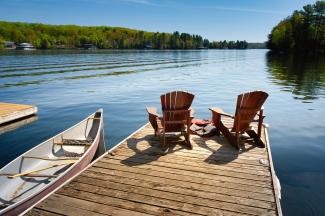
How to talk to your kids about inheriting the family getaway
Let's be honest - talking about what happens to the family cottage after you're gone isn't exactly a fun conversation. But here's the reality: While watching your kids – and even grandkids – grow up at the cottage is a beautiful dream, passing on the family getaway can be more complicated than it seems. Without proper planning, your idyllic summer retreat could become a source of family tension or financial strain.
Why have this conversation now?
The family cottage often holds decades of precious memories - summer barbecues, teaching the kids to swim, lazy afternoons on the dock and countless family gatherings. The emotional value is priceless. But the practicalities that come with passing your beloved getaway onto the next generation can be complex. Here are some of the short- and long-term considerations that come with passing along the cottage:
1. Immediate financial considerations:
- Maintenance costs and property taxes
- Capital gains tax implications
- Estate administration tax
- Future upkeep or renovation expenses
2. Long-term impacts on family dynamics:
- Shared usage arrangements
- Decision-making processes
- Protecting the property from external claims
- Ensuring fair treatment among siblings
Understand your transfer options
Before starting the conversation with your kids, it's helpful to understand the different ways you can pass on the cottage:
1. Gifting it during your lifetime
Pros | Cons |
|---|---|
|
|
2. Transferring it through your will
Pros | Cons |
|---|---|
|
|
3. Creating a cottage trust
When you create a cottage trust, you keep control and management of the cottage, while the trust owns the cottage.
Pros | Cons |
|---|---|
|
|
Start the discussion
Once you’ve thought of your vision for the cottage after you’re gone and how you’d like to transfer it, it’s time to talk about it with your kids.
Break the ice
Remember this conversation might be difficult for your kids. While you’ve spent some time thinking about how to pass on your property to your kids and what will happen after you’re gone, your kids might have a hard time picturing a future without you in it. Here are some ways to break the ice to make this a positive, productive and loving discussion:
1. Set the stage
Choose a relaxed time when everyone's together, maybe even at the cottage itself. Make it clear this isn't about making immediate decisions but starting an important family conversation.
2. Share your perspective
Start by expressing what the cottage means to you and your hopes for its future. This sets a positive, emotional foundation for what could otherwise feel like a cold and practical conversation.
3. Ask open-ended questions
To get your kids’ honest thoughts and reactions, try not to lead the conversation in one direction or the other. Ask open-ended questions from a place of curiosity, like:
- "How do you see yourself using the cottage in the future?"
- "What concerns do you have about cottage ownership?"
- "How would you feel about sharing ownership with your siblings?"
Key points to cover
As you continue the conversation with your kids, here are some key points to cover:
1. Financial realities
Now is not the time to smooth over the details. It’s important to be transparent about the costs that come with the cottage, including:
- Annual maintenance costs
- Property taxes
- Insurance
- Capital gains implications
- Future repair or renovation costs
2. Practical considerations
Talk about the logistics that will come shared ownership, including:
- Sharing – and who gets to use the cottage when
- How to make decisions fairly
- Dividing the maintenance responsibilities
- Coming to an agreement on rules related to renting or selling the cottage
- Partner/spouse involvement
3. Addressing challenges
Dedicate some time to talking about the challenges your kids might encounter as joint owners of the family cottage, including:
- Unequal financial situations. Depending on their financial situations, your kids might not be able to contribute equally to the cottage. Ask them how they’ll work together to handle this fairly.
- Geographic distance. Some of your kids might live too far away to use the cottage as much as others. Ask if this should affect ownership arrangements.
- Emotional attachment. Your kids might have varying levels of emotional connection to the property. How can you, as a family, address these differences?
- Family dynamics. Remember - if it's hard to get your kids to listen to you now, it won't be easier to dictate terms from beyond the grave. Consider how existing sibling relationships might impact shared ownership.
Moving Forward
Once you've had a chance to talk to your kids and get their input, consider these next steps:
1. Document your family’s preferences. Write down what each family member envisions for the cottage's future.
2. Seek professional advice. You don’t have to do it alone! Lean on professionals who have been there before – consult with:
- A financial advisor to discuss tax implications and funding options.
- An estate lawyer to understand legal structures and transfer options.
- A tax professional to optimize the transfer strategy.
3. Create a written plan. This is where the rubber hits the road. Work with professionals to create a written agreement that outlines:
- Ownership structure.
- Decision-making processes.
- Cost-sharing arrangements.
- Usage guidelines.
- Exit strategies.
4. Review your plan. Plan to revisit these discussions regularly as family circumstances change.
The Bottom Line
While it might feel uncomfortable at first, having open conversations about the future of your family cottage is crucial to preserving both the property and your family relationships. Remember, there's no "one-size-fits-all" solution - you know your family best, so consider what will work for your unique situation.
The key is approaching these discussions with sensitivity, openness, and a willingness to consider all perspectives. With proper planning, you can help ensure your family will be swimming in the lake by the cottage, not drowning in tax-related debt or family disputes.
Ready to plan your cottage's future?
Don't leave the future of your family cottage to chance. Let's work together to create a comprehensive plan that considers both the emotional and financial aspects of cottage succession. Our team can help you navigate the complexities of property transfer, tax implications, and family dynamics to ensure your cottage legacy continues to bring joy to future generations.
Contact us today to start planning for your cottage's future in a way that works for everyone in your family.
The information provided is based on current laws, regulations and other rules applicable to Canadian residents. It is accurate to the best of our knowledge as of the date of publication. Rules and their interpretation may change, affecting the accuracy of the information. The information provided is general in nature and should not be relied upon as a substitute for advice in any specific situation. For specific situations, advice should be obtained from the appropriate legal, accounting, tax or other professional advisors.

